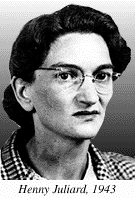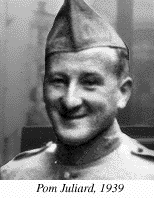 "Can I talk to you?" she said.
"Can I talk to you?" she said.
By 1942, the Nazi threat to the Jewish population in Holland had become severe. By May, Jews were required to wear the yellow star. More and more Jewish people were disappearing, caught in surprise raids and roundups. In July, the first two transports of Jews destined for "work camps" in the Reich left from Amsterdam.BERT BOCHOVE: Just a short time later, early in the summer of 1942, Henny Juliard came. She and my wife Annie had become close friends before the war, when they were both in the same sanatorium recovering from tuberculosis. Henny was from a poor Jewish family living in The Hague.
Selling in the store was very easy, but it was the hardest thing to get new stock. I had to go to Amsterdam almost every week. One day, coming home from a buying trip, I found Henny Juliard in the house.
 "Can I talk to you?" she said.
"Can I talk to you?" she said.
All at once, I sensed why she came. I never thought it over. I knew immediately that she would stay with us.
"I hope Annie has already told you that it's all right," I said.
I had never met her husband Pam, but of course, he had to stay too, although he didn't come until three months later because he was trying to save his little nephew. It did not work out. On both sides, their parents were already gone; there was plenty of misery around them.
Henny is very special--real quality. Coming from a poor family, she had only a little formal education, but she is a very intelligent woman, and speaks absolutely perfect French, German and English. Her husband Pam was a terrific fellow to have in the house. He had a way of making everyone laugh; even if he didn't feel good himself, he still joked around. He knew that his optimism helped everybody in the house.
 Henny had a sister, Ans Mendels, a home economics teacher living in a small town in the south. She was about forty years old--sort of an old maid--and a little bit sour, but she had a heart of gold. When Ans got in trouble with the Germans, she came straight to us. She knew it was time to leave, and we had room.
Henny had a sister, Ans Mendels, a home economics teacher living in a small town in the south. She was about forty years old--sort of an old maid--and a little bit sour, but she had a heart of gold. When Ans got in trouble with the Germans, she came straight to us. She knew it was time to leave, and we had room.
We had a big kitchen and living room, two bedrooms, and a very large hall. At first Henny, Pam, and Ans were living with us on the second floor, over the store. Later on, when we had more Jewish people, we used the attic on the third floor.
My wife was smarter and much more practical than I was. Right away when Henny came, she told me to build a hiding place, in case the situation got worse. She and Henny were really pressing me, but I was busy, and couldn't see the use of it. Maybe I was more optimistic than they were. I took things easy and let the consequences come later. But they were simply trying to help themselves. Finally it penetrated that they were right, and I built it. It's good that our family had that place, too, because later on it saved our lives.
The Hiding Place: Bert's building shared a wall with the house next door. The brick firewall dividing the two structures was actually behind the place where the two rooflines met, under what appeared from the outside to be the neighbor's roof. At the point where the two roofs met in his attic, Bert built a new wall, creating a large triangular room behind it, under the neighbor's roof. He camouflaged the new wall by exactly matching its wood and joinery to that of the rest of the attic. The hanging door he built swung open from the bottom. To conceal the seam, he added shelves along the top edge of the door that he filled with drugstore goods. The bottom edge was hidden by a beam placed all the way across the floor. On the inside of the new wall Bert stapled old packing paper so that to someone knocking on it, the sound was the same as the other attic walls.

One day in '42, my brothers called asking me to help a business acquaintance of theirs who was in trouble. Abraham Rodrigues was a salesman for women's apparel. His family were Portuguese Jews, known as Sephardic. They had been living in Holland for maybe 250 years, but still proudly maintained their Portuguese heritage. Abraham and my father had met by chance on a street car, around 1915, and a business relationship developed between them that continued on with my brothers after our father died. I had never met him.
"Can you take Rodrigues and his wife and two kids?" they asked me.
"Well, I'll see what I can do."
I went to the Rodrigues house in Amsterdam to talk it over, and found out that they were ready to go. It was high time too; they really were in danger. There were parents and others in that family that were already caught. Back in Huizen, I arranged with a skipper who had a delivery business, to go the next day and load up all their possessions onto his boat. Meanwhile the Rodrigues family came to my house by train. Two days later the Gestapo came to pick them up, but their house was empty.
Across the street from us was a little grocery store with a big long attic above; you couldn't see it from the outside. We told those people that we all had to help the Jews. And since they had extra room, and we were happy to pay for it, could they please store the Rodrigues family stuff. They said yes, fine, only the piano they couldn't have; it was too big to get up the stairs. Well, I had a commercial building with a wide staircase, and a big hallway. It took four strong fellows to get it up, but we were glad to have it. Annie liked to play the piano, and the guests too.
After the Juliards and the Rodrigues family, it was all unknown people coming into my house. There was a network in the underground that brought people to us: I didn't understand how it worked, and was never interested either. After all, with so many strangers coming into my house, the less I knew the better. Sometimes it wasn't until years later that I knew their real names; with some, I never learned them.
The next to come was Peter--his real name was Lou--Ickersheim, with his wife and three kids. They were from The Hague. He was a large, happy man, with a strong Hague accent, uneducated, but he had a good set of brains--that type. Peter was a Jew, but with his blue eyes and bald head, you couldn't really tell. He was a very fine fellow. His wife was quiet.
The postmaster in Huizen, who was a friend of ours--well, let us say, an acquaintance--knew what was going on; when there was trouble we could count on him. He lived in a huge place on top of the post office, which was ideal. When we were overcrowded two of the Ickersheim kids often stayed there, although most of the time they were at our place.
With the Juliards, the Rodrigues and Ickersheim families all living in the house, it was becoming a little crowded, so I built two large bedrooms in the attic. Then I added a balcony on the second floor. On fine days the Jews who couldn't leave the house could take sunbaths, concealed by the bedding hung over the railing to air out. So we were all in the house together, plus a girl from Woubrugge--Diet Rosendaal--who also worked in the store. She knew everything and was dependable.

After Jopie had been with us for about a year she asked my wife if she could take a week's vacation. I went off to Amsterdam for a buying trip the same day she left. When I came back the house was very quiet. It was after closing time. Only my wife and Diet were there. "What happened?" I asked. Annie told me the story.
That morning Peter had helped Jopie carry her suitcase to the streetcar. When he came back he said, "That suitcase was awfully heavy. I don't trust her. And, she left this box for me to drop off at the post office. I think we should take a look." So they opened the package, and it was all stolen stuff: toothbrushes, nice pieces of soap--pre-war quality, and all from the store. She must have been stealing and hiding those things for months. But that was nothing compared to the letter they found.
"Dear Jopie, When you go away on vacation we'll get the Jews out of the house." It was written in German. She was engaged to a German soldier!
What could we do? Diet immediately brought Rodrigues and his wife to Utrecht where Diet's aunt lived. There was no time to warn the aunt; she just brought them, and they were accepted. This aunt's apartment shared a staircase with the apartment next to it. They had just arrived and were halfway up the stairs, when down from the other apartment came a National Socialist wearing his black boots and black shirt. Rodrigues, seeing the fellow coming, spit on the stair in front of the man. It was tremendously dumb, but Rodrigues was impulsive. The N.S.B.'er said nothing, but a few days later they picked him up, and his wife, too. They went to the concentration camp and never came back. No trace.
We sent all of the Ickersheims directly to the postmaster, except Peter, who stayed in the store because he had good papers and didn't look Jewish. Diet took the two Rodrigues kids to her family in Woubrugge, where they lived for the rest of the war. Our Doctor van den Berg, who was taking care of all the Jews in the community, came right over to our house with an official sign: "Quarantine, Typhus." It was already hanging on our door by the time I got home from Amsterdam. The whole neighborhood knew the typhus sign didn't mean anything, and still came to the store, but the Germans were afraid, and stayed away.
The next day my wife took the train to pay a visit to Jopie's family. I couldn't go because, being near Germany, that area was closed to Dutch men. Jopie was not there, so Annie spoke to her mother, making it very clear to her that if anything happened to the Bochove family, or to the Jews in the house--and Annie didn't know if this woman might be half German or not--her Jopie would be killed, and not to forget it. The mother nearly had a heart attack.
That's how Annie was: she saw what needed to be done. I think it was a good thing that she went, too. We never saw Jopie again. The quarantine sign hung on our door for about fourteen days. By that time everybody was back in the house. The Germans never came.